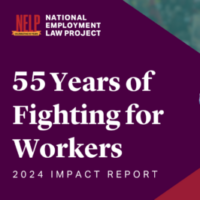Most U.S. workers can be fired from their job at any time and for any reason—or for no reason at all. Among wealthy, industrialized countries, the U.S. is unique in allowing employers to terminate workers without warning or explanation. This system—called “at will” employment—traces its roots to post–Civil War white employer backlash after the abolition of slavery, forced labor, and debt bondage in the U.S. In a good-jobs economy, all workers should be protected against arbitrary and unfair terminations. Such protections are called “just cause” job protections, and they are the employment law standard in much of the rest of the world.
What Are ‘Just Cause’ Job Protections?
- Employers are required to provide workers with fair notice of any performance issues and give workers the opportunity to address those issues before firing them.
- Employers must provide a good reason for any disciplinary actions and termination and provide documentation of that reason to workers.
- Employers must provide advance notice before a termination.
- In addition to just cause protections that protect workers from abrupt and unfair termination, discharged workers should receive severance pay to prevent sudden financial hardship.
How Pervasive and Harmful Are Abrupt and Unfair Firings in the U.S.?
A nationwide survey conducted in 2022 by NELP and YouGov shows how widespread abrupt and unfair firings are for U.S. workers and how harmful their effects are for workers and their families.
Among the key findings:
- 40% of U.S. workers have been fired or let go at some point in their lives.
- 69% of workers who have been terminated were given no reason or an unfair reason.
- 72% of workers who’ve been fired were given no warning or chance to improve.
- 66% of workers who were terminated received no severance pay.
- 41% of U.S. workers have only enough savings to cover one month’s expenses if they lost their job.
- 53% of Black workers have only enough savings to cover one month’s expenses.
The survey shows that workers’ fear of being fired causes many to accept poor working conditions.
- 35% of U.S. workers have worked under hazardous or unhealthy conditions to avoid being fired.
- 44% have endured verbal abuse or hostility from a supervisor to avoid being disciplined or fired.
- 57% have worked unwanted overtime to avoid being fired.
Abrupt and unfair firings can result in extreme financial hardship for workers and their families who are suddenly left with bills and rent to pay but without a paycheck or severance pay. And they hurt Black, Latinx, and immigrant workers the most, since they are more likely than white workers to face longer periods of unemployment after a job loss and have less savings or family wealth to fall back on. The at-will system also makes it easy for employers to retaliate against workers who speak up about concerns such as health and safety hazards, harassment, discrimination, and wage theft.
Workers Are Organizing to End Unfair Firings
Increasingly, workers are coming together to fight for just cause protections and require employers to provide advance notice, a good reason, and a fair process for any termination.
For the first time in decades, workers are organizing to replace the at-will employment system with just cause job protections. Fast-food workers in New York City have been at the forefront of this movement, successfully campaigning to enact a local law prohibiting unfair and abrupt firings in their industry. Challenged in court by business lobby groups, the law has been upheld by federal district and appeals courts. In 2019, parking lot workers in Philadelphia won the right to fight unfair firings with a local just cause law. Journalists at publications including The New Yorker and The New York Times’ Wirecutter have won just cause protections in their union contracts. Rideshare drivers in Seattle and then statewide in Washington won legislation protecting them against unfair terminations. In New York City, the Secure Jobs NYC coalition is campaigning for a bill to protect all workers in the city from unfair firings. And, in Illinois, the Stable Jobs Now campaign is organizing support for a statewide just cause law.
What Key Protections Are Needed in Just Cause Laws?
The following should be among the core provisions of effective just cause legislation:
- Require the employer to show a good reason for discharging a worker, with the burden of proof residing with an employer to prove a termination is justified.
- Clarify that certain reasons, such as refusing unsafe work are protected activities and not grounds for discharge.
- Provide fair notice to workers of performance issues and the opportunity to address them before being discharged.
- Provide equal coverage for temp and staffing employees.
- Protect against extreme surveillance and electronic monitoring.
- Guarantee severance pay to all workers who are discharged.
- Protect gig workers against “deactivation” without just cause.
- Provide strong remedies and relief, including the right to reinstatement, money damages, and additional employer penalties.
- Ensure that just cause protections can be enforced before judges and juries—regardless of forced arbitration requirements and class or collective action waivers.
Given how common unfair firings are, it’s not surprising that these commonsense policies are broadly popular across the political spectrum. NELP’s 2022 national survey showed that 66% of U.S. workers support just cause policies, including:
- 61% of Republicans
- 66% of Democrats
- 72% of Independents
In sum, the prevalence and harmful impacts of unfair terminations demonstrate an urgent need to extend just cause job protections to all U.S. workers. Obtaining such job security protections for U.S. workers is essential for building a good jobs economy — one that will provide the high-quality, safe, and equitable employment that workers need and the dependable economic security and stability that allows families and communities to thrive.
Related to
Related Resources
All resourcesShernice Mundell, Former Federal Employee

Worker Voices
2025 NELP Policy and Advocacy Agenda

Policy & Data Brief
2024 Impact Report: 55 Years of Fighting for Workers

Report
